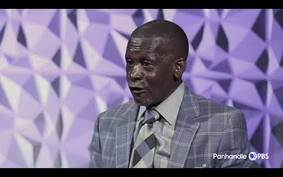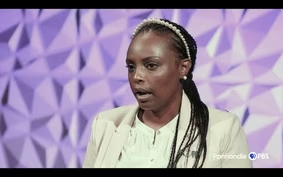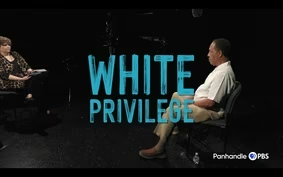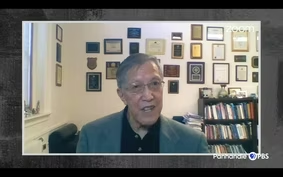
The System wasn't created for Black Americans
Season 3 Episode 303 | 26m 37sVideo has Closed Captions
A look at movements then and now from our Black neighbors in Amarillo.
A look at movements then and now from our Black neighbors in Amarillo. "If we don't get this right, America's not going to be the same anymore."
Problems playing video? | Closed Captioning Feedback
Problems playing video? | Closed Captioning Feedback
The Handle is a local public television program presented by Panhandle PBS

The System wasn't created for Black Americans
Season 3 Episode 303 | 26m 37sVideo has Closed Captions
A look at movements then and now from our Black neighbors in Amarillo. "If we don't get this right, America's not going to be the same anymore."
Problems playing video? | Closed Captioning Feedback
How to Watch The Handle
The Handle is available to stream on pbs.org and the free PBS App, available on iPhone, Apple TV, Android TV, Android smartphones, Amazon Fire TV, Amazon Fire Tablet, Roku, Samsung Smart TV, and Vizio.
Providing Support for PBS.org
Learn Moreabout PBS online sponsorship- [Narrator 1] Warning, this program contains strong language and racial slurs.
Audience discretion is advised.
(somber music) - [Narrator 2] A season of protest in 2020 turned up the volume on the nation's dialogue about race and racism.
It's a talk we've begun and dropped for decades.
- [Male] If you're an American, if you love your country, you have to talk about it.
- [Narrator 2] It's time.
The conversation starts with listening.
- It's my opinion that today what we're seeing, is a new generation of civil rights leaders and those who will march and do whatever it takes for complete civil rights.
They're marching for justice today.
My generation, we did civil rights.
It was our thing to have the right to vote.
Today, it's about justice and equality, which brings us on a plain with the rest of America.
- I think the power of social media has kind of given us a very big leverage.
We're seeing things happen faster.
We're seeing things happen, like, we're able to kind of scrutinize every government decision.
We now have the ability to research every single decision that they make.
And so I think there's definitely a big opportunity here, and I think it could be successful in even just awarding us more liberties and more rights.
I think this could be very, very big.
- I think that it is opened up enlightenment to a lot of people, as far as just looking at various systems in our country, whether it's education, or our political system, judicial.
So, it's a lot of people out there that are now for better/worse, woke and ready to go out and fight the good fight to keep this country on the path of, you know, being very fair to everyone.
- There's so much work to be done.
Some of it has to be visual.
Some of it has to be in your face.
When it comes to the violence, I don't condone the violence by any means, but I also see things like what Dr. King had said when he had visited the young leaders after the Watts riots.
They looked at him and said, "We won."
And Dr. King looked at him confused, like, "What do you mean you won?"
And they told him, "They heard us, they see us."
And he stepped back, and having to look at his life, his education, everything that allows him to say, "My decision-making looks this way because of my background."
He is also asked to look at those young men and say, "You were also doing the best to your ability level.
"You don't have a college degree.
"You don't feel like your voice is empowered.
"You don't feel like the system has been built for you.
"So when you are burning down a building, "or you're doing something like that, "you're controlling what you can control."
And saying, "Well, yeah, in your mindset, you did win.
"But how do we get to a point "where we can have conversations and do things "so those individual's voices are heard "in a more productive way?"
And this is where that's something we're tasked to do, because again, there's a gap and that opportunity gap has made it so now some protests look different than others.
Where we have a community like ours who protest and we have done it in a very commendable way, but it's also led by very educated individuals who use compassion and empathy.
That's not happening everywhere.
- Amarillo has not responded well, I don't think.
In a lot of the cases of the protests here, we've seen counter protesters who have been very aggressive, very mean-spirited.
Most recently there was a teenager and she organized a memorial.
And when everyone showed up, it wasn't a very, very large group of people.
They just started talking about their feelings and how they were coping.
And we didn't make it through the complete circle of people that were there, before she came and told us that she would like for us to leave because she felt unsafe because the counter protesters were open carrying a weapon.
I mean, this teenager, in particular, was called a race baiter and a terrorist.
And she's only a teenager.
- There were more people out there watching us than there were participating in the memorial itself.
We had really big trucks with flags and whatever they could find, driving by, making sure that we weren't being aggressive and violent, when that wasn't even the case at all.
We had people waiting at the entrance, to the point where people got so scared that they started to leave.
- Our school system doesn't do a great job of teaching us the proper history of, especially civil rights.
We get a very small portion of what actually happened.
And I actually learned that in Selma, you know, seeing everything that went on there.
And when you historically look at stuff that has happened between the Black community and the White community, you get a better sense of why things still are the way they are today.
- [Interviewer] What did you not know that you learned?
- I didn't know during the Bus Boycotts, that there was a lot, like, you know, we see a lot of rioting today and people dealing with things in a violent manner.
And when the Bus Boycotts occurred, I didn't realize that there were White mobs doing exactly what's going on today.
It was an exact representation in pictures.
- Years ago, I heard this and somebody said, "Well, you're just tearing up your neighborhood."
And, yeah, right, you are tearing up your neighborhood, but how many of those people in that neighborhood have any ownership?
If they go and burn down a Walgreens, Black people don't own Walgreens.
So you're in my neighborhood and you're doing business, but what have you added to my neighborhood?
And it's not the idea, give me something free 'cause I'm Black, but if you're part of the community and you're taking my money in this community, you have to buy in, you have to buy in.
The looting is just, it's not right.
Don't get me wrong, I'm not condoning looting, but it's when you have years and years of pent up anger and you get a chance to strike back, you do.
- Violent protest, in some eyes, is warranted.
In mine, it's not.
We would get what we needed a whole lot easier if we stood up the right way.
And that goes back to voting, and that goes back to talking to city officials.
And that goes back to talking to our police chief and seeing exactly how they intend to police us as a community.
And if there's any opposition to that, just for safety sake, to actually meet with the demographic that we deemed to be the most likely to be, you know, in prison and talk with them, and educate them.
So everybody actually needs to come together as a community and work it out.
We've talked about it for a long time.
Are we afraid?
Yeah.
No one wants a target on their back 'cause we don't know how intense this struggle can get again, especially in light of what's happening in places like Portland and across the country.
- What's interesting is that, you know, we had reputable news sources all confirm what we we have long been stating is that, you know, the vast majority of these protests have been peaceful.
I think people just get a little afraid when they see us come together like that.
And us being the American fabric, the American citizenry, Black, White, you know, Democrat, Republican, Christian, non-Christian, all together with one collective message, and that's Black Lives Matter.
And people can get mad at that statement and say, "Oh, I don't agree with the movement."
I don't personally agree with every tenet of the Black Lives Matter movement as a Christian, but I'm a Black man.
My family has a lot of African-Americans, and people that love us who are not African-American, and we all agree that Black Lives Matter.
So for people to get upset by a simple statement, man, it just, they're missing the point.
All we're saying is that we matter too.
- We got a lotta accomplished back in the '60s, but it just seemed like people wanna take us back and we shouldn't go back, we should be moving forward in my opinion.
And it's just a whole different level of what's going on today, compared to what was going on in the '60s.
And if we don't get this thing right, America's not gonna be the same anymore.
And so, I pray to God that we come together and make some change, and I'm ready to do it.
- [Narrator 1] The death of George Floyd brought renewed focus on racism in 2020, but some argue it is the coronavirus pandemic that has laid bare the racism ingrained in our institutions.
- You will see particularly Black and Brown people who were in these positions, who have been deemed as essential workers.
However they do not have, and generally their employers do not have additional funds to be able to offer them the correct amount of protection, to protect them and their families.
Many of them live in housing where they're gonna be in close contact with people, which puts them, again, at a higher risk.
Many of them do not have adequate health insurance, if they have any at all.
Where we see that more minorities and people of color are actually facing the brinks of being evicted or foreclosed, because they have not gotten more stimulus money to help them, and their unemployment, and their unemployment checks are now being cut, or they're running out.
In terms of just the housing stock that is available.
If you wanna talk about that, that is also, as we know, that goes way back to the days of red lining, and predatory loaning, and all of those kinds of things that have impacted Black and Brown and people of color more so than it has White Americans.
- I'm gonna play devil's advocate here.
What would you say to the people who would say the housing is available, they can move anywhere they want?
- I would say you need to prove that in realistic terms.
So, even if that housing is there, there's no guarantee, number one, that you will be able to move there and be welcomed there.
And that you'll be able to get a mortgage and a loan for there, to move there.
Although there are Truth in Lending guidelines, there's still loaning practices that make it tougher for people of color to get mortgages.
- Systemic racism has existed since the Emancipation Proclamation.
And we see it all over the place in housing, we see it in corporate America, where it's the pink elephant in the room, but it's not spoken of.
And for those who do speak up about it, then they're largely ostracized, demoralized.
For years, black people have told the community, the police, anyone who would listen, For years, black people have told the community, the police, anyone who would listen, that they were treated differently than their white counterparts.
And it's only even with these cell phones capturing what is going on that it's still difficult to get a lot of people to understand the lived reality of individuals.
When people tell me police officers need to undergo implicit bias training.
Well, that's helpful up to a point, but it has not resulted in changes.
And they will oftentimes say there's only a few bad apples.
But I know from my studies that good people can do bad things based upon the cultural context of an organization that is present there.
Our military - in order to make it easier for soldiers to harm and kill the so-called enemy, the enemy is de-humanize.
The Vietnamese, when we fought were called gooks or slant eyes or German krauts.
Those are labels meant to say that they are de-human, they are not human beings kill them.
We are not connected to them at all.
And I see racism thriving in very much the same way - The system wasn't created for Black Americans to thrive in ever.
And if we arrest a certain amount of people and we put them around other people who have done bad things, the story is gonna continue to be true.
- [Narrator 1] War on drugs policies have produced far different outcomes for communities of color.
Although minorities use and sell drugs at a similar rate as Whites, 57% of those incarcerated in state prisons for drug offenses are Black or Latino.
- And I don't wanna blame police, I wanna blame the policy that allows police to do that.
So it's, police are just doing their job.
They're just doing what the policy dictates.
They're just doing what they feel is right in some instances, but it's not.
It is really criminalizing, like I said, people for being Black, and writing a narrative that African-American communities are not safe, that African-American people can't be safe without being overly policed.
So that narrative has to change, not just in our community, within police departments.
They have to realize too, that the numbers don't indicate that that's been a successful system, that we need more more programs in place to deal with mental health, that deal with depression, that deal with addiction, that deal with stress management.
And that will help make a better community and a safer community for police to work in.
- And that's where the conversation has to start when it looks at reforming the system, when it looks at talking about things that are sticky subjects, like what does police defunding really look like?
And to a point where somebody in education says, "But is it okay that we spend more on defense than education?"
If that officer was more educated, if George Floyd was more educated and it was more readily available to him, would that situation have even happened?
- A lot of it, government has played such a part in instituting policies that, at their core, sometimes are racist or allow for racism interpretations, or racist interpretations.
And so that's why we're working and calling on government to now work to help to eradicate and to revise policies and to look at those types of things, to be able to better reflect the diversity of this country.
We'll never eradicate racism, but if we're truly to disarm and dismantle it, I think that the answer lies in pre-K through 12.
If our parents, if our caretakers, if our teachers really had a anti-bias curriculum, we would nip these biases at the bud before, we become adults.
I mean, for you and me, we may be a lost cause, we have to unlearn everything to really do that struggle.
But it would be so much easier if we didn't have these fears and biases instilled in us to begin with.
white privilege is the unearned benefits and advantages that accrue to people, white skinned individual, by virtue of their light complexion.
It is the counterpoint of what I call the myth of meritocracy.
That if you work hard enough, you earn things in society.
Don't wanna get political, but Molly Ivins, you might know, syndicated she passed quite a few years ago.
She wrote something when George Bush, the second George Bush ran for president, that is the epitome of understanding advantages in our society.
She said that George Bush was born on third base and believes he hit a triple.
And what she was saying is that George Bush was advantaged in his life.
He benefitted from economic privilege, from male privilege and from white privilege.
He started at third base.
And for people of color who don't enjoy the advantages of white privilege, there are many people of color who have worked equally hard as George Bush or any of the 98% of white CEOs in our nation.
If you ask them, all of them would say, I worked hard and sacrificed.
And I don't doubt that they did.
But what they don't realize is that they were advantaged.
And that there are many women and people of color who have worked equally hard and probably some much more competent and skilled will not make it to the batter's box.
This is a nature of the invisibility of whiteness, that is a default standard that makes it very difficult for white people to really see the advantages of whiteness in our nation and society.
- So, tell me about White privilege.
- You're the majority.
You basically wrote the preamble, the constitution, you were there from day one in the seats of power.
We were not there, we were on the outside building those infrastructure to the seats of power.
We were in the fields ensuring that the crops were taken care of and brought to production at the timely manner.
We were nursing your children.
We were the driving Miss Daisy, so to speak.
We were on the outside not even able to look through the door.
So the privileges that you didn't recognize anyone but yourself, we were ignored, we were invisible.
So when the opportunities came, as you were accounted for, you were expected to move up that ladder into those particular seats, and it was actually the privilege was that it was there for you to.
And that chair, an empty chair, was yours to sit in.
We made the chairs, we brought them in and allowed for you to sit down, but the expectation was you are only looked at as three-fifths of a human being, not even a human being.
So you weren't there until, not only the Civil War and Abraham Lincoln's freeing of the slaves, but the language began to incite and rise.
African-Americans, after reconstruction, after the Jim Crow laws, after the Civil War, after the Civil Rights, more and more engagement that it was beginning to have opportunities, but still the privilege was that you have to wait, you have to wait, it's coming, but you gotta wait for your time.
My time, my time is now.
(gentle music) - [Narrator 1] Next time on "the HANDLE," Living While Black.
- What they're asking me is, why can't you let it go?
- I was always reminded of my oppression and never taught that I could be more.
- It'll shine a negative light onto the majority of White Americans.
- I was scared as you are to the truth.
(somber music) (dramatic music)
Civil Rights vs. Black Lives Matter
Video has Closed Captions
Clip: S3 Ep303 | 9m 57s | A look at the differences in the Civil Rights Movement & the Black Lives Matter Movement. (9m 57s)
Video has Closed Captions
Clip: S3 Ep303 | 8m 13s | A look at how a flawed system impacts our communities of color. (8m 13s)
White privilege with Alphonso Vaughn
Video has Closed Captions
Clip: S3 Ep303 | 2m 54s | Alphonso Vaughn discusses what the term "white privilege" means. (2m 54s)
White privilege with Dr. Derald Wing Sue
Video has Closed Captions
Clip: S3 Ep303 | 2m 28s | Dr. Derald Wing Sue defines and discusses the concept of white privilege. (2m 28s)
Providing Support for PBS.org
Learn Moreabout PBS online sponsorship
- News and Public Affairs

Top journalists deliver compelling original analysis of the hour's headlines.

- News and Public Affairs

FRONTLINE is investigative journalism that questions, explains and changes our world.












Support for PBS provided by:
The Handle is a local public television program presented by Panhandle PBS



